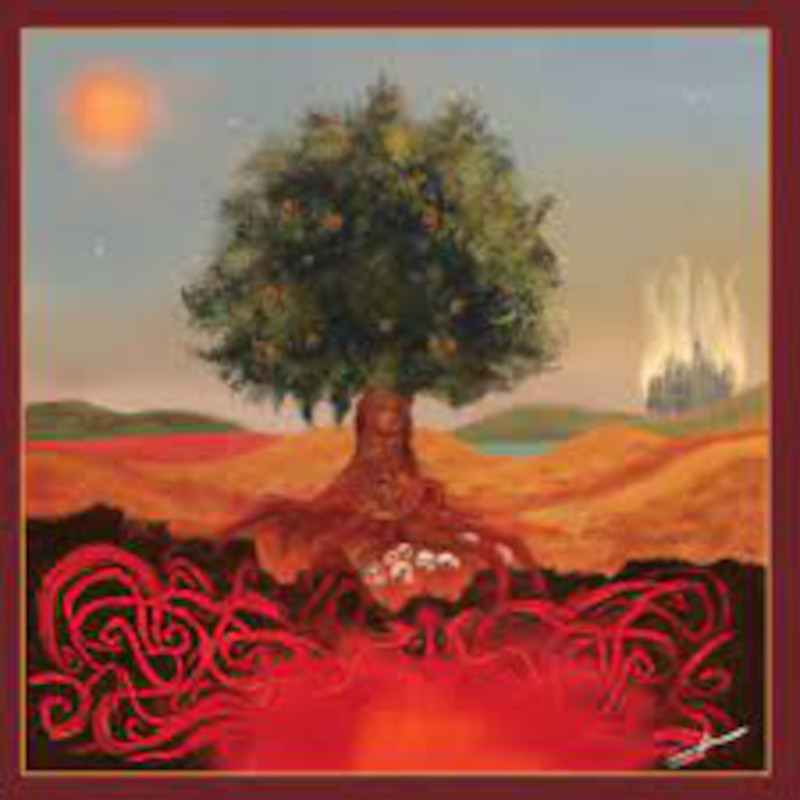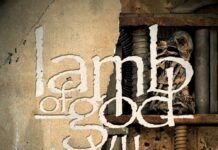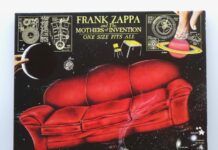In May 2008, the Swedish prog-metal maelstrom, OPETH, released their ninth full-length studio album, “Watershed,” which was to mark the end of an era for the band. Indeed, the aptly named outing served as a watershed moment, a zenith, after which our ears would no longer be treated to those beautifully brutal growls of vocalist Mikael Åkerfeldt. The following album, “Heritage,” released in September 2011 via Roadrunner Records, was the band’s first studio offering to feature no growling whatsoever. Whereas the band had previously only flirted with old-school prog, this OPETH release was a full-fledged skin-dive into the muddy realms of 1970s-tinted hard-rock and prog. The instrumentation on the album reads like the stereotypical recording rig of some vintage prog outfit: Hammond B3 organs, Rhodes pianos, and Mellotrons. Even the guitar tones were perfectly honed to pay homage to those revered 1970s hard-rock classics. Although “Heritage” received generally favorable reviews from the music press, a good number of fans vented their frustration on various online music forums at the time, accusing the band of selling their soul to the boomer gods of classic rock. Love it or hate it, as some critics pointed out, the outing was a brave move.

From an artistic point of view, OPETH had explored the brutal aspects of progressive metal to the max on the previous albums. In a way, they only had two options: to either evolve or keep repeating the tried-and-true pattern ad infinitum with a high probability of becoming boring and uninspiring. While “Heritage” is by no means the band’s tour-de-force when it comes to the new, jazzier style, the album has stood the test of time exceptionally well, considering all the backlash it prompted among the hordes of “tr00” metal fans at the time of its release. I must admit to having felt the subtle sting of disappointment upon first listening to the album back in the day. After all, the album that converted me to the parish of OPETH acolytes was the stellar 2001 studio outing, “Blackwater Park.” It was THE album that even made me lose my completely ungrounded disdain for growled vocals. By a cosmic stroke of irony, listening to the band’s 2008 album release, I suddenly found myself craving for something that I had not even liked very much just a few years earlier. In terms of unearthly growls, nobody did it better than Åkerfeldt. Had the sound of vintage prog not been one of my guilty pleasures, I might not have given “Heritage” the ghost of a chance to begin with. Over time, the album grew on me, however. Considering the complete stylistic U-turn from brutal and progressive death metal to the verdigrised sound of the 1970s Canterbury scene, “Heritage” sounds exceptionally cohesive. Yes, there are a few moments of idling about on the album, but the banger tracks slap so hard that the overall feel is rather enticing. “Heritage” may not be the OPETH release that I go back to the most. I do spin the album now and then, however, to realize each and every time that it is much better than I remembered.
One of the most banging tracks is the leading single of the outing, “The Devil’s Orchard,” premiered in July 2011. I can still recall how the song got my hopes up for the much-anticipated album release upon first listening to Åkerfeldt crooning against the backdrop of the song’s oriental guitar riffs, which took quite a substantial nod toward the proto- heavy metal epics of the 1970s. Later, when the song’s music video was premiered on YouTube, its impudent free-fall into the netherworld of retro-psychedelia further pronounced that OPETH was up to something completely different this time around.
However, listening once through the actual album, I was probably not the only one whose preconceived notions about it were totally shattered. The new OPETH release turned out to be something else than variations of “Child in Time” with growls. First of all, there were no growls to be found. Then, despite the occasional onslaught of sepia-filtered hard-rock, like the RAINBOW-homage of a track, “Slither,” a good number of songs hit more close to home with the eclectic prog and folk of yesteryear – the type of music that is allegedly not dead, although it smells really funny.
Long-time fans of OPETH were probably very well aware of the fact that all the band members shared a love for vintage prog. Åkerfeldt‘s guitar-playing style and tone preferences have been influenced and inspired by the CAMEL guitarist, Andy Latimer, as much as NAPALM DEATH. In fact, it has been one of the unique characteristics of the band, the way his lyrical guitar lines create a stark contrast to the brutal riff-a-thons. On this album, the brutal side was turned down a notch while the lush lyricism prevailed. Along with the complete non-existence of metal growls, this was one of the likely reasons for some of the band’s long-time fans to start feeling a bit estranged. The album even features the Swedish flutist, Björn J:son Lindh, and the WEATHER REPORT percussionist, Alex Acuña, both on the 8-minute prog-epic, “Famine.” Maybe the old-school metalheads had a justified fear that all these fusion jazz and hippie folk elements would eventually lead them to ditch their old, trustworthy thrash-vests in favor of some dubious bell-bottom trousers. Frankly, it is hard to imagine instruments such as flute, percussion, or even vintage drawbar organ on, say, “Blackwater Park.”
One of the pet peeves on many a classic prog album is the amount of instrumental doodling, that mindless jamming that isn’t really progressing anywhere. “Heritage” is not totally devoid of this misdemeanor. While the track, “Nepenthe,” for example, introduces a killer riff in the song’s refrain (I think it is the song’s refrain, though with prog you can never be sure), the verses feel poignantly stagnant. Of course, the effect is pronounced if you listen to the tracks in isolation. Listening through the album in one go, these sonic plateaus of wandering about may not stand out like a sore thumb.
The following track, “Häxprocess,” also deploys a fair selection of Gilmourian guitar licks that reverberate into near-silence. Maybe these doodlings could have been served more justice by sandwiching them between the more perky and robust riff-a-thons, tracks such as “The Lines in My Hand” and “Folklore.” These two tracks, especially, let the band’s bassist, Martín Méndez, shine. Then again, the album has a certain flow to it and I am not sure if changing the order of the songs would really be an improvement.
Obviously, this is one of those albums that is definitely not meant to be listened to in a car while driving down the E12 highway. For the fans of proggy music of the kind that incorporates crescendos from whisper to a scream as well as stop-and-go riffs over the course of 7+ minutes, “Heritage” is a treasure trove of ear-candy. It was an album that radically altered the progressive metal ecosystem. At the time of its release, it almost felt as though it was utterly out of place: a death metal band playing 1970s prog?! It felt almost as strange as a mariachi band of doom launching into a tequila-lubricated series of hyperbolic revelry in the spirit of PARADISE LOST. Over the years, the album has slowly grown on us – well, at least some of us – and it has proven to have a merit of its own. In the back catalog of OPETH, “Heritage” is probably more of a watershed album than its predecessor blessed with the title.
Written by Jani Lehtinen
Tracklist
- Heritage (Instrumental)
- The Devil’s Orchard
- I Feel the Dark
- Slither
- Nepenthe
- Häxprocess
- Famine
- The Lines in My Hand
- Marrow of the Earth (Instrumental)
- Pyre (Bonus Track)
- Face in the Snow (Bonus Track)
Lineup
Mikael Åkerfeldt – guitar, mellotron, grand piano, vocals
Fredrik Åkesson – guitar
Per Wiberg – grand piano, mellotron, Rhodes piano, Hammond B3
Martín Méndez – bass, upright bass
Martin Axenrot – drums, percussion
Label
Roadrunner




